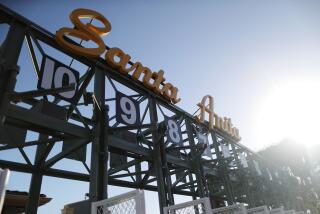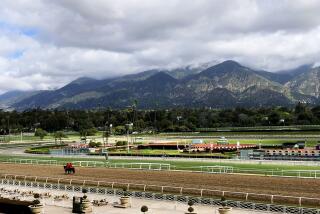Reunion Is About Respecting the Elders
From Lloyd Dane, the first Pacific Coast stock car driving champion in 1954, to Eric Norris, the 2002 points leader, Tim Meyer’s first West Coast Stock Car Reunion last Friday night in Monrovia attracted a wide range of fender-banging enthusiasts, including NASCAR President Bill France Jr. and his wife, Betty Jane, from Daytona Beach, Fla.
Nostalgia was the main course as generations of stock car drivers, car owners, crewmen and promoters tried to outdo one another with tales of derring-do from one era to another. Most of the real old-timers were amazed at how far NASCAR and its West Coast stepchild, the Winston West, have come in 50 years, and the youngsters were amazed at hearing how primitive racing was conducted 50 years ago.
Dane told of driving his Hudson Hornet from his home in Buena Park to the racetrack, taping over the headlights, racing the car and driving it home after the event.
The watershed event of West Coast racing was Jan. 10, 1971, at Riverside International Raceway.
That was the day that Ray Elder, a farm boy from Caruthers, Calif., driving a family-owned, family-prepared Dodge to victory over the NASCAR hotshots from the South, beat the likes of Richard Petty, Bobby Allison, Benny Parsons, Bobby Isaac and others. It was so shocking to the hierarchy in Daytona Beach that NASCAR at first refused to list Elder among its race winners.
It was also a watershed day for NASCAR as the Motor Trend 500 was the first event of what turned into a $1-billion windfall for stock car racing--the sponsorship money from R.J. Reynolds Tobacco Co., in the name of the Winston Cup.
Elder received $19,165 for the win. Bill Elliott, last week’s Winston Cup winner at Pocono, Pa., won $193,401 and will also participate in the $14-million end-of-season point fund.
“People are always asking me if I didn’t wish I was in it now, instead of 30 years ago,” said Elder, still a farmer in Caruthers, “but I tell them I couldn’t afford to be in it now. Back then, we bought a Dodge from Jack McCoy, fixed it up in the garage at the farm, towed it about 200 miles to Riverside behind a two-seater truck, unloaded it and raced.
“If we were trying to race today, we couldn’t afford to buy a car and [brother and crew chief] Richard and the volunteer crew couldn’t keep up with the big bucks they spend today. I can’t believe all those 18-wheelers that carry the cars to the track while the drivers fly around in their jets. Richard and I used to take turns driving the pickup to the races.”
Ray Elder, balder and thinner than in the days he weighed 250 pounds in racing trim, still runs the family farm outside Caruthers, a tiny spot in the San Joaquin Valley. But things are different now.
Richard Elder, the 300-pounder known as Big Red, died five years ago. Fred Elder, the father who helped his boys with their racing dreams, died 15 years ago. And the 240 acres of alfalfa and cotton they worked in the ‘70s is now 140 acres of Thompson seedless grapes, to be dried into raisins.
“We thought about trying Winston Cup, but it would have meant moving down south and if I got hurt or something and things didn’t work out, we could have lost everything, back there and here, too, so we decided to stick with the farm. Besides, I never seemed to be accepted by NASCAR.”
Elder was not only referring to the way he was slighted after winning at Riverside. It went back to an earlier race, April 30, 1966, at Ascot Park.
“I had been a sportsman car driver until one night at Stockton, they had a doubleheader, a sportsman and a late model [later Winston Cup] race. I finished fifth in the late model and when I got more money than I got for winning the sportsman, I decided to switch.
“The next race was at Ascot and we took that old ’64 Dodge down there and won the race. But we were running some retread tires we’d bought from McCoy and after 200 laps at Ascot they had swollen and NASCAR officials said they were illegal in the post-race inspection. They said they wouldn’t pay us.
“We argued nearly all night and didn’t get paid until McCoy--he was one of the regulars that they knew--argued our case and told them we got the tires from him. Otherwise, we would have been out of luck because they didn’t take kindly to having some unknown kid come in and take their money.
“As it was, we didn’t get our money until 4 a.m.”
The Racin’ Farmers went on to win 47 races, second to McCoy’s 54 in Winston West competition, and championships in 1969, 1970, 1971, 1972, 1974 and 1975.
And just to prove that his 1971 win at Riverside was no fluke, Elder beat the big boys again in 1972 in the Golden State 400, a summer race at Riverside.
The CART Case
Chris Pook may get away with starting only 18 cars in his CART races on road courses, but how is it going to look when they are stretched around the two-mile California Speedway?
Especially after a couple of them failed to last the first lap, which seems to be becoming a CART trademark.
Five of their races have essentially been 16-car races.
Jimmy Vasser and Kenny Brack took each other out on the first lap Sunday in Vancouver. The race before that, in Cleveland, it was Townsend Bell and Mario Dominguez not making it through a single lap. In Chicago, it was Vasser and Brack again. At Laguna Seca, Adrian Fernandez and Dario Franchitti went home early. And in the season opener in Japan, it was Bell and Vasser (do we see a trend here?) not finishing a lap.
Only seven cars were running after 178 miles at the end of Sunday’s Vancouver race. How would that look at Fontana--which is 500 miles?
Last Laps
Kenny Bernstein will continue his relentless pursuit of Larry Dixon when the National Hot Rod Assn. travels to Infineon Raceway at Sonoma this weekend. Dixon, after winning seven of the first 12 events, has hit on hard times, failing to qualify once and losing in the first round the following week, so his lead is now down to an uncomfortable 97 points.
*
The Southern California Speedboat Club will present Long Beach Sprint Nationals, a series of championship circle boat races, Saturday in Long Beach Marine Stadium. Featured will be 140 mph K-Racing Runabouts (blown alcohol inboard flatbottoms), Formula Light tunnel boats, the quickest turning high-speed boats in racing, and water ski racers. Racing starts at 10 a.m.
*
Robby Gordon will drive in Sunday’s Brickyard 400 at Indianapolis, but with an aluminum insert in his left shoe to stabilize his foot. Gordon broke his left heel and sprained both ankles in a motocross bike accident near Pocono, Pa.
*
Patrick Long of Agoura celebrated his 21st birthday Sunday with a wire-to-wire win in the eighth race of the Formula Renault UK championship series at Snetterton. Later in the day, in the ninth round, he finished second in his Fortec Motorsport-prepared machine.
*
Ventura Racing Assn. sprint and senior sprint cars will hold their weekly competition Saturday night--but not at their home track in Ventura. With the one-fifth-mile track closed because of the Ventura County Fair, promoter Jim Naylor is taking his show to Perris Auto Speedway for the first of two appearances at the half-mile oval. They will return Aug. 17. It should be a novel experience, with drivers used to a fifth-of-a-mile track at Ventura turned loose on a half-mile oval at Perris.
*
Cory Kruseman of Ventura won the Jan Oppermann Classic last Saturday night at Terre Haute to clinch the Indiana Sprint Week championship. He edged J.J. Yeley in the eight-race series.
*
Veteran Jack Hewitt, who underwent five hours of neck surgery following an accident during Sprint Week, continues to recuperate at Indianapolis Methodist Hospital. He is listed as “stable.”
More to Read
Go beyond the scoreboard
Get the latest on L.A.'s teams in the daily Sports Report newsletter.
You may occasionally receive promotional content from the Los Angeles Times.










